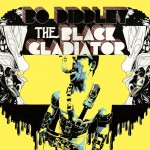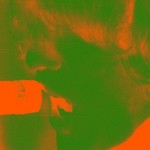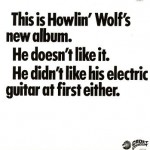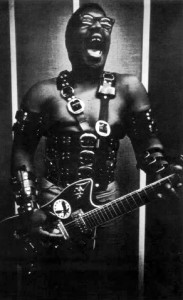-
Featured News
Patti Smith Upcoming Tour for 50th Anniversary of Horses
 By Harvey Kubernik
“Horses was like the first cannon blast in a war – frightening and disorienting. I mean, she was so unlike the FM radio terrain in every way. She was literate, aggress
By Harvey Kubernik
“Horses was like the first cannon blast in a war – frightening and disorienting. I mean, she was so unlike the FM radio terrain in every way. She was literate, aggress -
Featured Articles
Chasing the White Light: Lou Reed, the Telepathic Secretary and Metal Machine Music
 By David Holzer
Fifty years ago, Lou Reed released Transformer. In among “Walk on the Wild Side,” “Make Up” and “Vicious,” cuts that would launch a cartoon Rock N Roll Animal pers
By David Holzer
Fifty years ago, Lou Reed released Transformer. In among “Walk on the Wild Side,” “Make Up” and “Vicious,” cuts that would launch a cartoon Rock N Roll Animal pers -
HOWLIN’ WOLF – This Is Howlin’ Wolf’s New Album

(Get On Down) LP/CD
The Wolf said, “These electric guitars, they got them queer sounds,” and the full name of this funky, fuzz-filled fantastic footlong is This is Howlin’ Wolf’s new album. He doesn’t like it. He didn’t like his electric guitar at first either. This LP’s the famous financial folly (along with Muddy’s Electric Mud) by Marshall Chess on his Cadet imprint, trying the youth turn-on via throwin’ the roots in the sketch, with fruits like Hendrix in the foreground. The blues purists slagged it, but like much of producer Charles Stepney’s work, was later embraced by hip-hop producers and diggers of all stripes.
BUT, when speakin’ on this mess-terpiece the cast of cats adept in jazz, blues and soul that form the group is generally left outta the equation. This psychedelic solid-sender carries no less than four guitarists (Phil Upchurch, Pete Cosey, Roland Faulkner), including long-time sideman and geetar goliath Hubert Sumlin. The funky, frisky and free rhythm section, Louis Satterfield (bass) and Morris Jennings (drums), along with Upchurch carried backup duties for many Chess, Cadet and outside artists including Terry Callier, Jimmy Reed, Donny Hathaway’s debut, Shel Silverstein, Curtis Mayfield and the Rotary Connection; while Cosey did time in the wild mid-‘70s with Miles Davis amongst others. The fevered flights are handled with finesse by this fab group and never descend into overwrought jamminess, while not kid-glovin’ the Wolf classics but bringin’ a new light to ‘em. The “Back Door Man” hisself also shines migh-tee brightly on the insistent-grooved, reverb-drenched track this sentence began with; the plaintive, slinky “Little Red Rooster” and the wah-wah’ed stutter funk of “Down in the Bottom.”
The fave-rave of the platter is the haunting, backwoods electric burn take of “Moanin’ at Midnight,” where you could hear crickets off in the distance if the amps were turned down a notch or two, but this whole disc begs repeated listens. So, if you’ve got an appetite for the wild, untamed and raucous, pick up this platter that matters! (jeremy nobody, esq)
(Originally published in Ugly Things #33, Spring/Summer 2012)
Bo Diddley – The Black Gladiator

(Future Days) CD
Recorded and released in 1970, The Black Gladiator was Bo Diddley’s first album of all new material since 1965’s 500% More Man. In the intervening half-decade the music scene had been through some pretty radical changes, and the astute and forward-thinking Diddley wasn’t about to be left behind. “I just decided to do somethin’ different,” he told biographer George R White. “Everybody was wearin’ funny lookin’ crap—Isaac Hayes had come out with chains an’ stuff on, an’ it was kinda flowin’ in that area at that particular time—so I got me some belts an’ stuff, an’ said I was The Black Gladiator.”
The resultant album is one of the overlooked gems in the Diddley catalog, showcasing a freakier, funkier sound that was in step with the times, while retaining the raunch and swagger that defined his earlier work. Bo goes balls-out on the very first track, “Elephant Man,” whipping up a torrid, wall-shaking guitar riff over which he hollers some of his craziest rhymes yet, about how he constructed this bizarre animal, called the elephant (maybe you’ve heard of it?), piece by piece, naming its various body parts, then letting out a blood-curdling scream every time he gets around to not quite mentioning its ass. Such profundity was in short supply at the time.
The album never quite scales the elephantine heights of its monster opening number, but there’s still much to enjoy. The backing band cooks throughout—plenty of wailing organ, rattling tambourines and crisp, funky drumming—and Bo is clearly having a ball with this new, different sound. “Black Soul,” “I’ve Got a Feeling” and “Funky Fly” all boast tough, memorable grooves as well as plenty of muscular guitar work. “You, Bo Diddley” is one of Bo’s archetypal self-tributes, as is “Power House,” a virile boast built around his trusty “I’m a Man” riff, while the strange but wonderful “I Don’t Like You” is one of Bo’s trademark signifying pieces in the tradition of “Say Man,” with Bo trading insults with backing singer Cornelia Redmond (a.k.a. Cookie Vee) and also showing off his abilities as an opera singer—was there no end to this man’s talents?
There’s been a vinyl boot doing the rounds, but this digipak CD with liners by Scott Schindler is a legit, from the masters, reissue on Light in the Attic’s new Future Days imprint. (MS)
(Originally published in Ugly Things #33, Spring/Summer 2012)
OMEGA – Ten Thousand Paces

(Jegrfa Productions/Moiras, Hungary) LP
Omega was one of Hungary’s most successful groups in the ’60s and ’70s. In fact, they’re still together, celebrating their 50th anniversary this year. This limited edition LP rounds up some of the very best obscure tracks from what is now considered Omega’s ‘classic’ period, 1968-70. Their progressive beat sound has a dark, epic feel, characterized by dramatic vocals, keyboard-dominated arrangements, and the type of cerebral, poetic lyrics that could only derive from living in an oppressed Eastern European country. “One day the sun / too tired to shine / Slept in the deep, green somber lake / And in the darkness the world did ail”—that sort of thing.
Several of the tracks here are superior English language versions of songs from their second (and best) album, 10,000 Lepes, including the superb “Petroleum Lantern” with its bouncy, upbeat groove and bluesy harmonica fills, the powerfully-charged ballad “Pearls in Her Hair,” and the title track, “Ten Thousand Paces,” a tense, drama-laden epic full of moaning Gregorian voices, and some manic, panicked guitar scribbling. Even better is “The Prodigal Son” (not the Beggars Banquet song), a thumping rocker with a killer fuzz guitar riff, blaring gladiator trumpets, and an uber-anguished banshee vocal.
The 1970 single “Dead Are the Flowers” has an attractive pop-psych arrangement, while the previously unreleased “Varakozni Jo” (one of the few Hungarian-sung numbers) is highlighted by some lovely, bendy guitar work. Meanwhile, “Vigyazz, Vigyazz ram” is a previously unreleased vocal version of a song from their ’68 debut album, Omega Red Star, its wailing Hammond and slightly hysterical vocal bringing to mind the Crazy World of Arthur Brown.
The set comes in a colorful psychedelic gatefold sleeve and includes a large foldout poster with photos, liner notes and all the lyrics (in English). It’s a splendid way to make the acquaintance of one of Eastern Europe’s most inventive and fascinating bands. (MS)
More info: http://moiras.somoskiado.hu/


